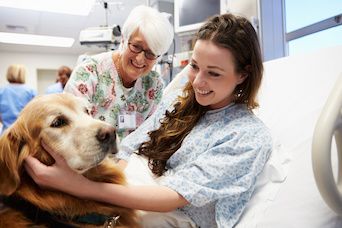Reducing MRSA Transmission Between Therapy Dogs and Cancer Patients
In a first-of-its-kind study, a simple decolonization protocol in an outpatient cancer center was shown to reduce MRSA infection in children and therapy dogs.

The benefits of pairing adolescent cancer patients with therapy dogs are far-reaching, and hospitals nationwide have adopted programs to help their patients thrive despite harrowing diagnoses. However, even with many positive attributes, these partnerships are not without risk—particularly when it comes to the spread of methicillin-resistant Staphylococcus aureus (MRSA), which can put the health of immunocompromised children in further jeopardy.
Thankfully, simple yet effective steps can help minimize the risk of MRSA infection in these situations. This is according to new study results presented at IDWeek 2018 in San Francisco, California.
RELATED:
- The Biggest Risk Factor for MRSA Carriage Among Veterinary Workers
- Trained Therapy Animals Boost the Moods of Cancer Patients
The program used for the study included 4 trained therapy dogs that regularly visit with 45 patients (ages 2 to 20) receiving outpatient cancer treatment at Johns Hopkins Bloomberg Children’s Hospital in Baltimore, Maryland. On a typical day, the dogs participate in numerous one-on-one and group visits, moving between departments and even hospitals. The decolonization protocol adopted for this study included shampooing the dogs with antibiotic chlorhexidine before the first visit of the day and wiping their fur with chlorohexidine wipes every 5 to 10 minutes during visits.
To determine the protocol’s effectiveness, the dogs were not decolonized for the initial 7 control sessions. During this time, the investigators found that 4 patients (15.4%) and 3 dogs (42.9%) became MRSA carriers after a visit. In the 6 sessions in which the dogs were decolonized, 1 patient (4.5%) and 2 dogs (33.3%) became MRSA carriers.
Of course, the study results also showed that the children who interacted with the dogs experienced improved physiologic scores (decreased blood pressure and heart rate) and mental health scores. “It’s amazing to watch just how excited the children get when they see the dogs for the first time, and they enjoy petting, hugging, kissing, and playing fetch with them,” said Kathryn Dalton, VMD, MPH, a co-author of the study and PhD candidate at Johns Hopkins University Bloomberg School of Public Health in Baltimore. “The visits are really helpful in easing their anxiety and stress.”
The investigators also grouped children depending on the amount of physical interaction they had with the dogs. The patients who interacted more closely with the dogs, such as by petting, hugging, and brushing them, were 6 times more likely to become MRSA carriers than those who did not interact as closely. Once the dogs were decolonized, however, the risk for those in the close interaction group matched that of the group with little interaction.
“This intervention not only decreases MRSA transmission from the therapy dog to the patient but also indirectly between patients or from the hospital environment to patients, with the dog as an intermediary,” Dr. Dalton said. “Decolonization is inexpensive and fast—it can be done by hospital staff or even the dog handler—and improves patients’ and dogs’ safety.”